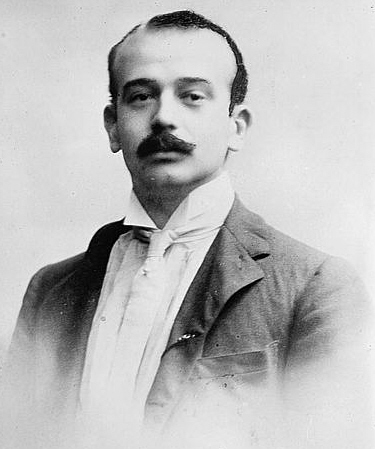A Free Country
The Aftermath of the Revolution Part 1
Krusevo, Current Capital of the United Macedonian State
The men that had comprised the leaders of the original Internal Macedonian Revolutionary Organization sat in the room of their provisional Capital Building, joined by a few other members that had come with the international brigades. The air was full of tension, fingers tapping tables, and everyone looking to the door of the room. The tension wasn't with eachother, the tension was that they were waiting for the last member of their group to arrive. Tane Nikolov, the man in charge of War Plan East, and the one they had designated as the delegate to the treaty was supposed to be arriving shortly with the news.
A treaty that might have seen their dreams of an independent state realized, or set them on the course of years of conflict that they might not win. Damyan Gruev sat at the head of the circular table as he played at his beard. Bandages along his arm from where an Ottoman bullet had nearly killed the President of the revolution at Debar. The man, and indeed most leaders of the revolution understanding that to rally the hearts of their soldiers, they needed to lead from the front themselves. He had been planning for this day, and his eyes drifted to some of the other members of the party. Those he had talked to over the past few days.
Then the door nearly broke off its hinges as Tane came in. The large bulgarian man cut an imposing figure with his rifle over his shoulder. "It is done Companions! We are free!"
There was cheers throughout the room, and they only grew louder and more enthusiastic as they saw the treaty themselves. The territory they gained through their devotion to independence. Though soon enough Gruev would stand up and motion for the rest to quite down. Leaning forward to place his palms on the table as the rest of the leaders of the Revolution sat. "Now we must plan for the post war situation. No longer are we a revolution, instead we are now a state, and we must conduct ourselves for the betterment of the people that are now under our provisionary leadership."
"We have already seen just how the world considers us. While some were willing to arm us directly, the states of the world held us at much further then arms length. This may have been workable while as a revolution, supported from abroad by popular movement." Gruev nodded toward two men who were the most 'radical' of the original IMRO. Yane Sandanski and Georgi Delchev, were both red dyed socialists. Though of different groups. Sandanski being one of the first to call for a completely independent Macedonia, and Delchev being more middle ground on the topic. Yane would be easy to deal with, he had extensive ties to some Turkish organizations that could be used against him. Delchev on the other hand could not. "As a state it cannot work though. We need to be able to maintain international relations. I've been considering this since the beginning, and many I have asked have agreed. Our best hope to keep the power with the people, while still allowing us to be a member of the international community is to adopt a governance much like that of the United States of America. A republic without a king. Not full disassembly of government but as close to a government of the people as possible."
There was some uproar but not much. Only the die hard socialists really expected anything different. The majority of those at the table nodded to their provisional president.
Yane stood up and stated. "And what of us, will you bow to international will and put us in chains?"
"Of course not." Gruev said, giving Yane a steady, piercing stare. The force of will of the Provisional President enough to cow what many saw as one of the more ambitious members of the organization. "I ask you to please step back from the political arena for now Yane. You and Delchev both. These early years will be the most important. Stability needs to be our primary goal and we cannot risk infighting within the government itself."
Yane and Delchev both made moves to speak up again, but a slap on the table by Tane silenced them. The bear of a man glaring as well. "Let him finish."
"Thank you Tane," Gruev nodded to the bulgarian. Then turned back to Yane and Delchev. "I'm not asking either of you to leave politics forever. For now though we need to show the world that we can work with them. Five years is all I ask, then you can form your party and rejoin politics, form your own party then if you wish. As long as you remain within the bounds of the constitution we will begin to set today then I do not care what you do once the grace period has passed."
Delchev sat back down at that. The younger man satisfied that he would get his chance later. Yane though ooked around the room for support, and while the few that had been added from the International Brigade seemed like they might speak up. They were few and knew this was not their issue to speak. Not to mention the only man in the room that was armed right now firmly seemed to support Gruev. Finally Yane sat down as well, nodding. "I do not like it, but I can see the logic. I hope you have no plans to cut us out from the drafting of our constitution?"
"No, we are still friends after all, and you have both fought for this country as hard as I. It would be villainous of me to disbar you from the next few days of drafting." Gruev gave a small smile to those at the table. "Now, let us begin. We have much we need to discuss."
----
Victory!
A Speech by Tane Nikolov to soldiers of the Revolution.
"Men! Today marks the day of our victory! With the Treaty of Kavadartsi we are free. Free to move forward and develop a state of our own. Free to decide for ourselves, what the future of the Balkan Peoples within Macedonia will be. To those of you from lands afar. We thank you greatly for your service. Those from lands truely distant, those from England, France, and other states across Western Europe. Now you may return to your homes, to your families, or if you have no such place to return to. The Provisional Committee offers any foreign soldier to settle down and make a home within our borders. To become a citizen of our new country. To any that came from our neighbours. To the Greek, Bulgar, Romanian, Serb and Albanian. You are free to settle here as well, for the United Macedonian State stands by its statements that all ethnicities and religions within its borders shall be treated equally. You are free to return to your homes as well though. The State will provide extra funds to make the return trip to your home country if you wish. To those who live here, live within the borders of our new country. We ask you to stay with the service. The coming months, and the years following will be difficult times. For even though we have won our freedom, now we must craft a country. As soon as we are able to you will be demobilized and allowed to return home. As soon as we are able to ensure that you, and your families will be able to live a life of safety and comfort without worries of conflict both foreign and internal. But for now, put those thoughts to the side, for tonight we celebrate! To our victory, to our freedom!"
(Effect: Demobilizing the International Division. The Three Local Divisions are to remain mobilized)
---
A Private Message Regarding the Message from the Albanian Kingdom
The United Macedonian State greatly appreciates the show of support of the Kingdom of Albania in recognizing the sovereignty of our country. We wish to ensure the Kingdom of Albania that steps are already being taken to forge what was once the United Balkan Revolution into a state that can function on the International Stage and that over the coming years will be a peaceful neighbour ot the rest of the Balkan States. Once the transfer of land has been formalized, and the UMS properly begins to administrate the region it has been awarded within the Treaty of Kavadartsi we wish to begin the development of trade between our two nations, and believe that co-operation between our two states could be greatly beneficial to both.
We understand the Kingdom's concerns over the current borders, but assure the Kingdom that with their formal complaint on the issue. The United Macedonian State is willing to assist in ensuring a civil discourse between the Kingdom of Albania and the Kingdom of Serbia, along with any other states that wish to be involved in said negotiations over the contested region, and is willing to offer the city of Priplep as a neutral ground for the negotiations to take place.
Sincerely,
Provisional President Damyan Yovanov Gruev of the United Macedonian State.











